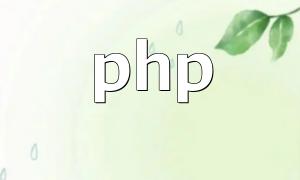PHP's dynamic typing means that variable types are determined at runtime, offering developers great flexibility. There is no need to declare variable types explicitly, making code simpler and easier to maintain. For example:
$variable = 10;
$variable = "Hello, world!";In the example above, the variable $variable is first assigned an integer value and then reassigned a string, demonstrating dynamic typing.
Weak typing allows values of different types to be compared or assigned without strict type enforcement. While this adds convenience, it can also lead to unexpected behavior. For instance:
if ($number == "10") {
// Execute code block
}Here, even if $number is a number, the comparison with the string "10" evaluates to true because PHP automatically converts types.
Dynamic and weak typing greatly enhance PHP development flexibility. Common scenarios include:
Despite the benefits, careful usage is important:
PHP's dynamic and weak typing features provide a flexible and efficient programming experience, but they come with some risks. Understanding how these features work and following good coding practices will help developers create robust and maintainable PHP applications.









